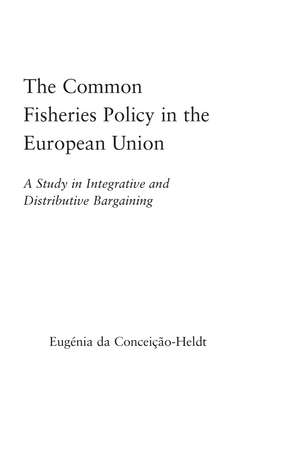The Common Fisheries Policy in the European Union: A Study in Integrative and Distributive Bargaining: Studies in International Relations
Autor Eugénia da Conceição-Heldten Limba Engleză Hardback – 25 feb 2004
Din seria Studies in International Relations
-
 Preț: 192.70 lei
Preț: 192.70 lei -
 Preț: 185.48 lei
Preț: 185.48 lei -
 Preț: 325.93 lei
Preț: 325.93 lei -
 Preț: 436.14 lei
Preț: 436.14 lei - 12%
 Preț: 300.49 lei
Preț: 300.49 lei -
 Preț: 433.05 lei
Preț: 433.05 lei -
 Preț: 220.76 lei
Preț: 220.76 lei -
 Preț: 284.34 lei
Preț: 284.34 lei - 17%
 Preț: 257.68 lei
Preț: 257.68 lei -
 Preț: 393.50 lei
Preț: 393.50 lei -
 Preț: 489.57 lei
Preț: 489.57 lei -
 Preț: 381.48 lei
Preț: 381.48 lei -
 Preț: 163.79 lei
Preț: 163.79 lei - 12%
 Preț: 312.43 lei
Preț: 312.43 lei -
 Preț: 493.80 lei
Preț: 493.80 lei -
 Preț: 379.93 lei
Preț: 379.93 lei -
 Preț: 390.96 lei
Preț: 390.96 lei -
 Preț: 438.14 lei
Preț: 438.14 lei -
 Preț: 194.51 lei
Preț: 194.51 lei -
 Preț: 283.80 lei
Preț: 283.80 lei - 27%
 Preț: 909.12 lei
Preț: 909.12 lei -
 Preț: 352.39 lei
Preț: 352.39 lei
Preț: 566.93 lei
Preț vechi: 1101.35 lei
-49% Nou
Puncte Express: 850
Preț estimativ în valută:
108.51€ • 112.86$ • 90.93£
108.51€ • 112.86$ • 90.93£
Carte tipărită la comandă
Livrare economică 13-27 martie
Preluare comenzi: 021 569.72.76
Specificații
ISBN-13: 9780415949026
ISBN-10: 0415949025
Pagini: 146
Ilustrații: 8 black & white illustrations, 6 black & white tables
Dimensiuni: 152 x 229 x 13 mm
Greutate: 0.32 kg
Ediția:New.
Editura: Taylor & Francis
Colecția Routledge
Seria Studies in International Relations
Locul publicării:Oxford, United Kingdom
ISBN-10: 0415949025
Pagini: 146
Ilustrații: 8 black & white illustrations, 6 black & white tables
Dimensiuni: 152 x 229 x 13 mm
Greutate: 0.32 kg
Ediția:New.
Editura: Taylor & Francis
Colecția Routledge
Seria Studies in International Relations
Locul publicării:Oxford, United Kingdom
Cuprins
Introduction: Analysing Negotiations in the European Union 1. Finding a Starting-Point: The EU as a Negotiating Polity 2. Methodological Problems when Analysing Negotiations in the EU 3. The Role of Theory in Political Science 4. Searching for Theoretical Conceptualisations of the EU Bargaining Game 5. The Need for a Multi-Theoretical Approach in the Analysis of Negotiations in the EU 6. The Road to New Findings I. The Settlement of the Common Fisheries Policy: Trying to Cope with a Changing Environment 1. Some Basic Facts: The Four Pillars of the Common Fisheries Policy 2. Explaining the Policy Transfer to the EU 3. The Open Access Character of Fisheries and the Overexploitation of Resources 4. The "Tragedy of the Commons" Applied to Fisheries 5. The State of the Art in the Common Fisheries Policy II. Constructing a Springboard: A Conceptual Framework for Analysing Negotiations in the EU 1. Setting the Stage 2. Defining the Players: Council-Commission Tandem or the Complexity of Principal-Agents Relations 3. Defining Actors' Preferences 4. The Institutional Setting: Formal and Informal Rules 5. The Empirical Analysis: Bargaining Games and Single-Peaked Preferences III. Actors' Preferences and the Institutional Setting in Action: An Integrative Bargaining Game 1. Negotiations in the EU as a Co-operative Game in Practice 2. The Negotiations on the Settlement of the Structural Policy and of the Common Market Organization 3. Explaining the Bargaining Outcome: Coalition-Building and Issue Linkage IV. Actors' Preferences and the Institutional Setting in Action: A Distributive Bargaining Game 1. The Settlement of the Conservation and Management Policy: The Acrimonious Negotiations on How to Divide the Fisheries Resources 2. Member States' Negotiating Positions: Restricted or Unrestricted Application of the Equal Access Principle 3. The Preference of the European Commission: The Importance of Having a Quota System 4. The Negotiating Process: When Actors' Preferences and the Institutional Setting Meet 5. Explaining the Bargaining Outcome: Side-payments and the Shadow of the Future 6. Relaxing the Unanimity Voting Rule in Fisheries: A Short Intermezzo on Showing Dissatisfaction with the EU System V. Conclusion, or Drawing the Threads Together 1. Conclusions: The Three Findings 2. Preferences of Member States Matter 3. Preferences of the Commission Matter 4. The Institutional Setting Matters 5. Some Generalizations about the Negotiation Process in the EU
Descriere
The purpose of this book is neither to duplicate overviews of the Common Fisheries Policy (CFP) nor to recapitulate narrative treatments of the European integration process. The aim is to comprehend how EU negotiations work theoretically and empirically so that a conceptual framework for analyzing EU international negotiations will be provided and juxtaposed to two key negotiations leading to the establishment of the CFP.
